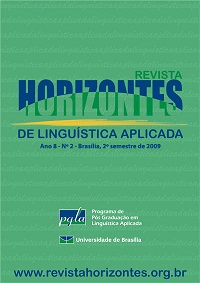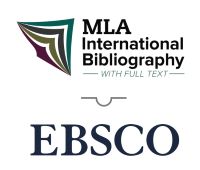Translation and language learning: AlfraCovalt as a tool for raising learners’ pragmalinguistic and sociopragmatic awareness of the speech act of requesting
DOI:
https://doi.org/10.26512/rhla.v8i2.772Resumo
Estudos em pragmática da interlíngua têm indicado que as categorias de atos de fala e suas estratégias de realização ocorrem em todas as línguas. Entretanto, não se aplicam da mesma maneira em cada língua. Para explicar esse fenômeno, Leech (1983) e Thomas (1983) dividem a pragmática em duas componentes: pragmalinguística e sociopragmática. Ao lidar com a pragmática, devem-se levar em consideração os meios que podem enfraquecer ou fortalecer a força do enunciado (i.e. conhecimento pragmalinguístico) e o conhecimento dos meios específicos que terão melhores resultados em um determinado contexto sociocultural (i.e. conhecimento sociopragmático). Neste artigo, argumentamos a favor da reconsideração da tradução como uma prática comunicativo-pragmática em contextos de línguas estrangeiras. Primeiro, fornecemos um breve histórico de como a tradução tem sido utilizada no ensino de línguas. Depois, sugerimos uma gama de atividades de tradução que podem beneficiar a aquisição da consciência pragmalinguística e sociopragmática dos aprendizes. Por último, indicamos como o programa AlfraCovalt pode ser utilizado para melhor desenvolver a consciência pragmática do aprendiz.
Downloads
Referências
ALCÓN,Eva. Desarrollo de la competencia discursiva oral en el aula de lenguas extranjeras: perspectivas metodológicas y de investigación. In: Muñoz, C. (Ed.). Segundas lenguas: adquisición en el aula. Barcelona: Ariel, 2002. p. 259-272.
ALCÓN, Eva. Does instruction work for learning pragmatics in the EFL context? System, vol. 3,p. 417-435, 2005.
ALCÓN, Eva;SAFONT, Maria P.;MARTÃNEZ-FLOR, Alicia. 2005. Towards a typology of modifiers for the speech act of requesting: a socio-pragmatic approach. RÆL: Revista Electrónica de Lingüística Aplicada, vol. 4, p. 1-35, 2005.
ALCÓNEva, SAFONT,Maria. P. Pragmatic awareness in second language acquisition. In: CENOZ, Jasone; HORNBERGER, Nancy H. (Eds.). Encyclopedia of language and education,vol. 6,Knowledge about language. 2 ed. New York: Springer, 2008.
BACHMAN, Lyle F. Fundamental considerations in language testing. Oxford: Oxford University Press, 1990.
BARDOVI-HARLIG, Kathleen. Evaluating the empirical evidence: grounds for instruction in pragmatics. In: ROSE, Kenneth R.; KASPER, Gabriele. (Eds.). Pragmatics in language teaching.Cambridge: Cambridge University Press, 2001. p. 13-32.
BARDOVI-HARLIG, Kathleen; DÖRNYEI, Zoltan. Do language learners recognize pragmatic violations? Pragmatic versus grammatical awareness in instructed L2 learning. TESOL Quarterly, vol. 32, n. 2, p. 233-259, 1998.
BARDOVI-HARLIG, Kathleen; HARTFORD, Beverly. Input in an institutional setting. Studies in Second Language Acquisition, vol. 18, n. 2, p. 171”“190, 1996.
BROWN, Penelope; LEVINSON, Stephen. C. Politeness: some universals in language usage. Cambridge: Cambridge University Press, 1987.
CANALE, Michael. From communicative competence to communicative language pedagogy. In: RICHARDS, Jack. C.; SCHMIDT, Richard W. (Eds.). Language and communication. London: Longman, 1983. p. 2-27.
CANALE, Michael; SWAIN, Merril. Theoretical bases of communicative approaches to second language teaching and testing. Applied Linguistics, vol. 1, p. 1-47, 1980.
CELCE-MURCIA, Marianne; DÖRNYEI, Zoltán.; THURRELL, Sarah. Communicative competence: a pedagogically motivated model with content specifications. Issues in Applied Linguistics, vol. 6, p. 5-35, 1995.
COOK, Misty; LIDDICOAT, Anthony J. 2002. The development of comprehension in interlanguage pragmatics: the case of request strategies in English. Australian Review of Applied Linguistics, vol. 25, 19-39.
CRYSTAL, David. (Ed). The Cambridge encyclopedia of language.2 ed. New York: Cambridge University Press, 1997.
FELIX-BRASDEFER, J. César. Interlanguage refusals: linguistic politeness and length of residence in the target community. Language Learning, vol. 54, n. 4, p. 587-653, 2004.
GARCÃA, Paula. Pragmatic comprehension of high and low level language learners. Teaching English as a Second or Foreign Language, vol. 8, p. 1-10, 2004.
GOODWIN, Charles.; DURANTI,Alessandro. Rethinking context: an introduction. In: DURANTI, Alessandro, GOODWIN, Charles. (Eds.). Rethinking context: language as an interactive phenomenon. Cambridge: Cambridge University Press, 1992. p. 1-42.
GRANT, Lynn.; STARKS, Donna. Screening appropriate teaching materials. Closings from textbooks and television soap operas. International Review of Applied Linguistics, vol. 39, p. 39-50, 2001.
GUZMAN PITARCH, Josep R.; SERRANO, Alvar. Alineamiento de frases y traducción: AlfraCOVALT y el procesamiento de corpus.Sendebar, vol. 17, p. 169-186, 2006.
GUZMAN PITARCH, Josep R.; MIQUEL, Francesc. In press. Splitting sentences for a parallel corpus using regular expressions.HASSALL, T. J. Requests by Australian learners of Indonesian. Unpublished doctoral dissertation. Canberra: Australian National University, 1997.
HOUSE, Julianne. Forthcoming. Using translation and interpreting to increase L2 pragmatic competence. In: ALCÓN, Eva; MARTÃNEZ-FLOR, Alicia. Investigating pragmatics in foreign languagelearning, teaching and testing.Clevedon: Multilingual Matters.
HYMES, Dell. On communicative competence. In: PRIDE, John B.; HOLMES, Janet (Eds.). Sociolinguistics: selected readings.Harmondsworth: Penguin, 1972. p. 269-293.
JUNG, Ji-Yung. Issues in acquisitional pragmatics. Working papers in TESOL and Applied Linguistics, vol. 2, p. 1-34, 2002.
KASPER, Gabriele. Pragmatic comprehension in learner-native speaker discourse. Language Learning, vol. 34, p. 1-20, 1984.
KOIKE, Dale A. Pragmatic competenceand adult L2 acquisition. Speech acts in interlanguage. Modern Language Journal, vol. 73, n. 3, p. 79-89, 1989.
KOIKE, Dale. A. Transfer of pragmatic competence and suggestions in Spanish foreign language learning. In: GASS, Susan M.; NEU, Joyce (Eds.). Speech acts across cultures: challenges to communication in a second language.New York: Mouton de Gruyter, 1996. p. 257-281.
LEECH, Geoffry. The principles of pragmatics. London: Longman, 1983.
LEVINSON, Stephen. Pragmatics. Cambridge: Cambridge University Press, 1983.
LI, Duanduan. The pragmatics of making requests in the L2 workplace: a case study of language socialization Canadian Modern Language Review, vol. 57, n. 1, p. 58-87, 2000.
LOCASTRO, Virginia. An introduction to pragmatics:social action for language teachers.Michigan: Michigan Press, 2003.
LORENZO-DUS, Nuria. Compliment responses among British and Spanish university students: a contrastive study. Journal of Pragmatics, vol. 33, p. 107-127, 2001.
MÁRQUEZ-REITER, Rosina. Linguistic politeness in Britain and Uruguay. A contrastive studies of requests and apologies.Amsterdam: John Benjamins, 2000.
MARTÃNEZ-FLOR, Alicia. Forthcoming. The effect of an inductive-deductive teaching approach to develop learners’ use of request modifiers in the EFL classroom. In: ALCÓN, Eva (Ed.). Learning how to request in an instructional language learning context.Bern: Peter Lang.
MARTÃNEZ-FLOR, Alicia.; USÓ-JUAN, Esther. Learners’ use of request modifiers across two University ESP disciplines. Ibérica, vol. 12, p. 23-41, 2006.
NIEZGODA, Kimberly; RÖVER, Carsten. Pragmatic and grammatical awareness. In: ROSE, Kenneth. R.; KASPER, Gabriele. (Eds.). Pragmatics in language teaching. Cambridge: Cambridge University Press, 2001. p. 63-79.
OLSHTAIN, Elite; BLUM-KULKA,Shoshana. Degree of approximation: nonnative reactions to native speech act behaviour. In: GASS, Susan; MADDEN,Carolyn. (Eds.), Input in second language acquisition. Rowley, MA: Newburry House, 1985. p. 303-325.
ROSE, Kennth R.; NG, Kwai-Fong. Inductive and deductive teaching of compliments and compliment responses. In: ROSE, K. R.; KASPER, Gabriele. (Eds.). Pragmatics in language teaching. Cambridge: Cambridge University Press, 2001. p. 145”“170.
ROSE, Kennth R. An exploratory cross-sectional study of interlanguage pragmatic development. Studies in Second Language Acquisition, vol. 22, p. 27-67, 2000.
SAFONT, Maria. P. Forthcoming. The speech act of requesting. In: ALCÓN, Eva. (Ed.). Learning how to request in an instructional language learning context. Bern: Peter Lang.SAFONT, Maria. P. Third language learners: pragmatic production and awareness. Clevedon: Multilingual Matters, 2005.
SCHMIDT, Richard. Consciousness, learning and interlanguage pragmatics. In: KASPER, Gabriele.; BLUM-KULKA, Shoshana. (Eds.). Interlanguage pragmatics. New York, Oxford University Press, 1993. p. 21-42.
SCHMIDT, Richard. Attention. In: ROBINSON, Peter (Ed.). Cognition and second language instruction. New York: Cambridge University Press, 2001. p. 3-33.
SCOLLON, Ron; SCOLLON,Suzie. Wong. Intercultural communication: adiscourse approach. Oxford: Blackwell, 1995.
SIFIANOU, Maria. Politeness phenomena in England and Greece: across-cultural perspective. Oxford: Oxford University Press, 1999.
TAKAHASHI, Satomi. Pragmatic transferability. Studies in Second Language Acquisition, vol. 18, p. 189-223, 1996.
THOMAS, Jenny. Cross-cultural pragmatic failure. Applied Linguistics, vol. 4, p. 91-112, 1983.
WASHBURN, Gay N. Using situation comedies for pragmatic language teaching and learning. TESOL Journal, vol. 10, n. 4, p. 21-26, 2001.
Downloads
Publicado
Como Citar
Edição
Seção
Licença

Artigos publicados pela Revista Horizontes de Linguística Aplicada são licenciados sob uma Licença Creative Commons Atribuição-NãoComercial-SemDerivações 4.0 Internacional.
Ao publicar na Horizontes de Linguística Aplicada, os autores concordam com a transferência dos direitos autorais patrimoniais para a revista. Os autores mantêm seus direitos morais, incluindo o reconhecimento da autoria.
Autores e leitores têm o direito de:
Compartilhar — copiar e redistribuir o material em qualquer suporte ou formato
De acordo com os termos seguintes:
- Atribuição — Você deve dar o crédito apropriado , prover um link para a licença e indicar se mudanças foram feitas . Você deve fazê-lo em qualquer circunstância razoável, mas de nenhuma maneira que sugira que o licenciante apoia você ou o seu uso.
- NãoComercial — Você não pode usar o material para fins comerciais .
- SemDerivações — Se você remixar, transformar ou criar a partir do material, você não pode distribuir o material modificado.
- Sem restrições adicionais — Você não pode aplicar termos jurídicos ou medidas de caráter tecnológico que restrinjam legalmente outros de fazerem algo que a licença permita.








